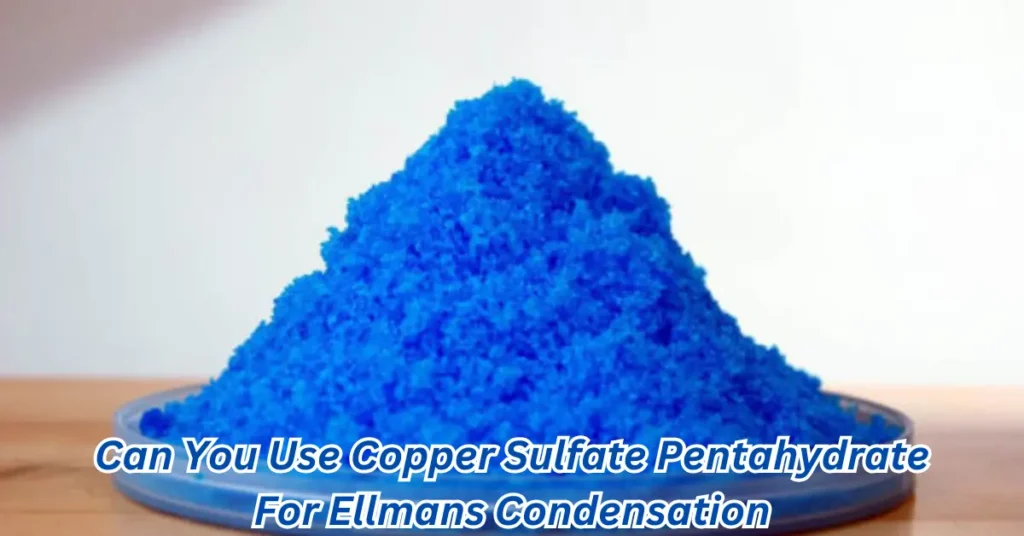Ellman’s condensation is a significant chemical reaction utilized to form carbon-carbon bonds, which are crucial for synthesizing a wide range of organic compounds. Can you use copper sulfate pentahydrate for ellmans condensation. An interesting inquiry is whether copper sulfate pentahydrate can be incorporated into this process.
Renowned for its effectiveness as a catalyst in various reactions, copper sulfate pentahydrate has the potential to improve the efficiency and results of Ellman’s condensation. This article will delve into the role of copper sulfate pentahydrate, highlighting its advantages and any possible limitations in this important chemical reaction.
What is “Can You Use Copper Sulfate Pentahydrate for Ellmans Condensation”?
Copper sulfate pentahydrate is a blue crystalline substance commonly used in chemistry. Ellman’s condensation is a specific reaction that facilitates the creation of new compounds by linking molecules together.
The key question is whether copper sulfate pentahydrate can be employed as a catalyst to enhance this reaction. Its use could potentially improve the reaction’s efficiency or speed. In this section, we will investigate whether copper sulfate pentahydrate is an effective choice for aiding Ellman’s condensation.
Why is This Important?
Understanding the potential use of copper sulfate pentahydrate in Ellman’s condensation is significant for several reasons:
1. Enhancing Chemical Reactions
- Catalytic Role: Copper sulfate pentahydrate may function as a catalyst, accelerating the reaction process. This is vital in organic chemistry, where reaction times can greatly influence overall efficiency.
- Improving Yields: Utilizing this compound could lead to higher yields of the desired products, making the process more productive and cost-effective.
2. Broadening Synthetic Applications
- Versatility: If shown to be effective, copper sulfate pentahydrate could be applied in various synthetic reactions beyond Ellman’s condensation, thereby expanding its utility in chemical synthesis.
- Innovative Approaches: New methodologies incorporating this compound could facilitate the discovery of novel compounds with diverse applications in pharmaceuticals, agriculture, and materials science.
3. Environmental Impact
- Eco-Friendly Options: Employing copper sulfate pentahydrate may offer a greener alternative to more hazardous catalysts, helping to reduce environmental pollution by using less toxic materials in chemical reactions.
- Sustainable Practices: Enhancing reaction conditions and efficiency can minimize waste and energy consumption in chemical processes, promoting sustainability within the industry.
4. Scientific Knowledge and Research
- Advancing Research: Investigating the role of copper sulfate pentahydrate in Ellman’s condensation contributes to the broader field of organic chemistry, enhancing our understanding of reaction mechanisms and catalyst interactions.
- Inspiring Further Studies: Positive findings from studies involving this compound could encourage additional research, motivating future chemists to explore its potential in various reactions.
5. Practical Applications in Industry
- Pharmaceutical Development: If copper sulfate pentahydrate is effective in enhancing Ellman’s condensation, it could expedite the production of crucial pharmaceutical compounds, leading to faster drug development.
- Chemical Manufacturing: Industries focused on producing chemicals for agriculture and manufacturing could benefit from improved efficiency and cost-effectiveness resulting from this research.
Exploring the use of copper sulfate pentahydrate in Ellman’s condensation is essential for enhancing reaction efficiency, expanding synthetic applications, promoting environmental sustainability, and advancing scientific knowledge. As research continues, the findings may open new avenues for innovation in chemistry, benefiting multiple industries and contributing to a more sustainable future.
Also Read: Argyle Middle School Principal Dies
The Role of Copper Sulfate Pentahydrate in Ellmans Condensation
Copper sulfate pentahydrate plays an important role in Ellman’s condensation by acting as a helper, called a catalyst. When scientists mix different chemicals to create new compounds, they often need something to speed up the process. This is where copper sulfate comes in!
- Helps the Reaction: It makes the chemical reaction happen faster without changing itself.
- Improves Results: By using copper sulfate, scientists can get more of the product they want.
- Works Well with Other Chemicals: It helps different molecules join together easily, making the whole process smoother.
Copper sulfate pentahydrate makes the process of creating new chemicals easier and more efficient!
Experimental Evidence
When scientists want to see if copper sulfate pentahydrate works well in Ellman’s condensation, they conduct experiments. These experiments help them gather information and evidence about how well it performs. Let’s break down what these experiments look like and what they can tell us!
1. Setting Up the Experiment
- Choosing the Right Ingredients: Scientists start by selecting the chemicals needed for Ellman’s condensation. This usually includes a compound that will react and copper sulfate pentahydrate.
- Creating a Controlled Environment: They carefully control things like temperature and time to make sure the experiment is fair. This way, they can see the real effects of copper sulfate.
2. Observing the Reaction
- Watching for Changes: As the reaction happens, scientists observe what changes occur. They look for things like color changes, bubbles, or the formation of new solid materials.
- Measuring Products: After the reaction is complete, scientists measure how much of the new product was made. This helps them understand if copper sulfate pentahydrate was effective.
3. Comparing Results
- Using Different Catalysts: Sometimes, scientists compare the results with other catalysts to see if copper sulfate pentahydrate is better, worse, or about the same. This helps them know if it’s a good choice.
- Analyzing the Data: They collect all the information from their observations and measurements. This data helps them make conclusions about the effectiveness of copper sulfate pentahydrate.
4. What the Evidence Shows
- Success in Reactions: Many experiments have shown that using copper sulfate pentahydrate can lead to successful Ellman’s condensation. This means it helps the reaction happen faster and produces more of the desired products.
- Reproducibility: Scientists repeat their experiments multiple times to ensure their results are consistent. If they keep getting the same results, it means they can trust their findings.
5. Why This Matters
- Building Knowledge: Each experiment adds to the overall understanding of how copper sulfate pentahydrate works. It helps scientists learn more about chemical reactions in general.
- Encouraging Future Research: Positive results encourage other scientists to explore more ways to use copper sulfate in different chemical reactions.
6. Real-World Applications
- Practical Uses: If copper sulfate pentahydrate proves to be effective, it could be used in industries that create medicines, food, and many other products. This shows how important these experiments are, as they can lead to new and better ways to make useful things!
Experimental evidence is essential for showing whether copper sulfate pentahydrate works well in Ellman’s condensation. By carefully setting up experiments, observing reactions, comparing results, and analyzing data, scientists can learn a lot about this compound and its role in chemistry. This research not only helps improve reactions but also contributes to developing new and exciting applications in the real world!
Limitations and Considerations
While using copper sulfate pentahydrate in Ellman’s condensation has many benefits, there are some limitations and things to think about:
1. Effectiveness
- Not Always the Best Choice: Sometimes, copper sulfate pentahydrate might not be as effective as other catalysts. Scientists need to explore different options to find the best one for each specific reaction.
2. Environmental Concerns
- Safety and Pollution: Although copper sulfate is less harmful than some other chemicals, it can still cause pollution if not handled properly. It’s essential to use it carefully to protect our environment.
3. Cost Factors
- Expense: Copper sulfate pentahydrate can be expensive for some projects. Scientists must consider whether the benefits outweigh the costs when deciding to use it.
4. Special Conditions Needed
- Reaction Conditions: Ellman’s condensation might require specific conditions (like temperature and pH) to work well with copper sulfate. If those conditions aren’t met, the reaction may not happen as planned.
5. Disposal Issues
- Waste Management: After using copper sulfate, scientists need to think about how to dispose of it safely. Improper disposal can harm the environment, so proper waste management is necessary.
6. Research Gaps
- Limited Studies: While some research shows that copper sulfate pentahydrate can help, there might still be gaps in our understanding. More experiments are needed to fully explore its potential and any possible downsides.
While copper sulfate pentahydrate is a useful tool in Ellman’s condensation, it comes with some limitations and considerations. Scientists need to think about effectiveness, safety, cost, and environmental impact to ensure they use it responsibly and effectively.#
Advantages and Disadvantages of Using Copper Sulfate Pentahydrate in Ellman’s Condensation
| Advantages |
| Effective Catalyst: Copper sulfate pentahydrate can speed up the reaction process, making it faster and more efficient. |
| Higher Yields: It helps produce more of the desired products, which can save time and resources. |
| Versatility: This compound can be used in various chemical reactions, expanding its usefulness in organic chemistry. |
| Eco-Friendliness: Compared to other catalysts, it is less harmful to the environment if used properly. |
| Disadvantages |
| Limited Effectiveness: It may not always work better than other catalysts, so its performance can vary. |
| Cost: Copper sulfate pentahydrate can be more expensive than other options, impacting budget considerations. |
| Environmental Concerns: Improper disposal and handling can lead to environmental pollution. |
| Special Conditions Needed: The reaction may require specific conditions to work well, which can complicate the process. |
Frequently Asked Questions about Copper Sulfate Pentahydrate in Ellmans Condensation
1. What is copper sulfate pentahydrate?
Copper sulfate pentahydrate is a blue crystalline compound commonly used in chemistry as a catalyst to accelerate chemical reactions.
2. How does it assist in Ellman’s condensation?
It serves as a catalyst, increasing the reaction speed and often resulting in higher yields of the desired products.
3. Is it safe to use?
While copper sulfate pentahydrate is less hazardous than some other chemicals, it still requires careful handling to prevent environmental pollution.
4. Are there any drawbacks?
Yes, it may not always perform as effectively as other catalysts, can be costly, and necessitates specific conditions to function optimally.
5. Can I dispose of it easily?
No, proper disposal is essential to avoid environmental harm, so it’s crucial to adhere to safety guidelines when disposing of it.
Bonus Points
- Versatile Use: Copper sulfate pentahydrate isn’t just for Ellman’s condensation; it can be used in various chemical reactions across different fields.
- Visual Indicator: Its striking blue color makes it easy to identify in experiments, helping scientists keep track of their materials.
- Educational Value: Using copper sulfate in experiments can teach students about catalysts and the importance of chemical reactions in real-world applications.
- Future Research: Ongoing studies may uncover new uses or methods for copper sulfate pentahydrate, expanding its role in chemistry even further.
Conclusion
Copper sulfate pentahydrate is an important catalyst in Ellman’s condensation, helping speed up reactions and increase product yield. While it has many advantages, such as effectiveness and eco-friendliness, there are also some downsides, including cost and specific usage conditions.
Overall, understanding its role can help scientists use it more effectively in chemical reactions while considering safety and environmental impacts.





